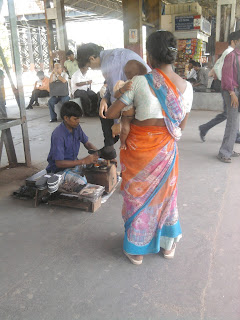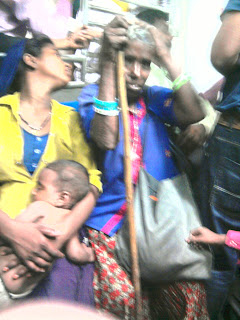In the past few weeks I have attended works of various artists - Sudhir Patwardhan (painter),Gieve Patel (painter) and Mithu Sen (artist) and Dayanita Singh (photographer)
Sudhir and Gieve have been trained as doctors. Their works have dealt primarlily dealt with the idea of body. Though both are doctors the representation of the body in their work is completely non clinical. In their paintings, the limbs never have the bony structure. Bodies donot have biological details. And both the painters capture very different moments in the city. In one of the paintings, Sudhir freezes an accident on the street, in another, he draws out the memories of Parel fly over and mills, talking about memory, history, pace of life in the city, transformation...Similarly, Gieve seems interested earlier in political figures. He also talks about experiences which can be relived while seeing paintings. One of Gieve's work was a sculpture 'Eklavya' - a bronze hand with a cut thumb. I wonder what the experience of an artist would be (who is actually a doctor) to construct a sculpture without a thumb. Similarly, Gieve's painting in which a group of crows were eating a mouse (or a lizard), where the lizard was cut open, the internal organs of the reptile have been blurred. A doctor would precisely know how things inside the body are placed, and when he chooses not to show them, it definitely is a thought to ponder upon.
On the other hand Mithus work (
http://www.mithusen.com/ ) was full of glutton, penises, skeleton and biologically morphed teeth and gums. Her work was very provocative. What she shared in the talk I attended was her difficult past and struggle with drawing in academics at Viswa Bharati, and also her difficulty with language. When she moved to Delhi from Bengal, she had a very strong accent, and also she would teach in a school, where people would make fun of her (and she would feel embarrassed). She took time to come out of this, and to become confident when later she got a scholarship to study in London. Her work explores sexual imagery which embarrasses the viewer and forces them to accept the hard reality of life (suddenly as if the position of the person who is making fun, and the person being made fun of was changed). What I saw in her work was the meticulous detail in the internal of the body - the intestines, the detail of teeth, gums, hair, etc. which talk about female sexuality.
The doctors were on the contrary subtle. I visited the exhibitions and talks with Subulakshmi, and infact her presence helped in raising sevaral of these distinctions. The work of art attains so much more meaning when one knows the history of an artist, which otherwise is assumed as a mere painting.
Dayanita's lecture at Max Mueller was another interesting one, where she spoke about book making. She spoke about her experiments in laying out books, distribution of books, publishing, and dissemination in the industry of publishing. Her ideas were great, and no doubt that she is a good artist. But photography, she said was something alien to her. She had actually went to study typography at NID. She ended up taking photograpy due to some strange reason where she felt she could express better through that medium. There was no stress on the act of taking a picture or photography in her entire lecture. I wondered if she actually was a photographer. She spoke about how she liked making little booklets, how she liked making books, presenting them in different ways to raise several questions about pulishing and the industry of prints. She shared her experiences with Gerhard, who is supposed to be a great publisher from Germany. However, it was silly when she said that her real place was the 'road', where once her work was displayed in the jeweller's shop front, where beggars, and paan walahs would point to people her work and ironically when she was selling her newest booklet (about 50 pages, vertical half A4) at MMB (without any bills) priced at Rs. 2000/-
Anyway,
l have several questions about artists, the practice of art and about who become artists, rather who should become artists? What separates one artist from another? Is there a relationship between medium that the artist uses and him/herself? Are artists confused people or people who are confident with confusion? In the above cases, I see that they project contradictions. Unfortunately these are encountered only by other artists. I wonder if these contradictions reach people. It's only the artist community which talks about such issues and artists become famous. How do artists become famous otherwise? They receive grants, huge amounts of money, for whatever they want to do - ofcourse once they get famous! Funny isn't it? But I am sure there is more to it. Otherwise who would raise these large questions of gender, identity, body, space, time, place...
I have many such complex issues with my own self. One of these I tried to raise in my thesis. I am not particularly skilled. Artists find a way of representing their contradiction (even thought they might not be skilled). Perhaps that is what is commendable. How does one represent complex issues with the self or the society? Artists bring these difficult or complex experiences together in some form. Can this form be architecture? Can architects be artists? A big debate. However, I am still to start a practice, and still to get a commission to experiment this question.
and for this question,
My father says, 'Life is very long',
and I believe that's the whole problem.





























